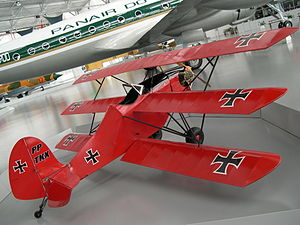The American Flea Ship (Flea Triplane) is a homebuilt triplane design of the early 1930s.[2] It is one of the first examples of a female-designed-and-built aircraft.[citation needed] One example is displayed at the Wings of a Dream Museum.[3]
| Universal American Flea Ship | |
|---|---|

| |
| Universal American Flea Ship | |
| Role | Homebuilt aircraft |
| National origin | United States of America |
| Manufacturer | Universal Aircraft[1] |
| Designer | Henri Mignet, Lillian Holden. |
| Introduction | 1939 |
| Developed from | Mignet Pou-du-Ciel |
Development
editThe American Flea Ship is a homebuilt triplane variant of the French-designed Mignet Flea licensed by American Mignet Aircraft, and later Universal Aircraft company of Ft Worth, Texas. It is also known as the Flea Triplane. The aircraft was given away by Universal as a marketing effort when a Universal motor was purchased to power it. Later, the fuselage sold for $695. The kit version of the aircraft was designed by Lillian Holden.[4] Ace Aircraft Manufacturing Company maintains the rights to the American Flea Ship and Heath Parasol.[5]
Design
editThe Triplane aircraft does not have ailerons, and uses variable incidence wings for roll control.[6]
Variants
editThe aircraft has been referenced under many names including;
- American Flea Ship
- Mignet HM-20
- HM-20 Flying Flea
- Flea Triplane
- TC-1 Flea (1954)[7]
Specifications American Flea Ship
editData from Aerofiles
General characteristics
- Capacity: 1
- Wingspan: 20 ft (6.1 m)
- Empty weight: 460 lb (209 kg)
- Powerplant: 1 × Universal , 40 hp (30 kW) Later models used a 65hp Continental
Performance
- Maximum speed: 87 kn (100 mph, 160 km/h)
Notes
edit- ^ Popular Mechanics. August 1940.
{{cite journal}}: Missing or empty|title=(help) - ^ "American Flea Ship". Retrieved 7 Jan 2011.
- ^ "A Brazilian dream becomes reality".
- ^ "American Flea". Retrieved 7 Jan 2011.
- ^ Frederick Thomas Jane. Janes All the Worlds Aircraft.
- ^ The Aeroplane, Volume 92.
- ^ Evan Hadingham. The fighting triplanes.